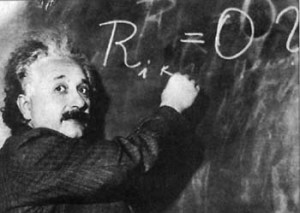
Einstein is Relatively Special
Recently the question of the units of energy in Einsteins E = mc2 came up in conversation. It seems the “meters squared” caused confusion. So here’s a short derivation of the units for energy.
The speed of light in a vacuum is denoted ‘c’ (lower case). The mass of a particle is ‘m’. E is energy.
The units in E = mc2 are derived as follows:
E = mc2 (Eqn. 1)
E = Energy, measured in units of Joule
m = mass, measured in units of kg
c = speed, measured in units of ms-1 (meters per second)
Note that ‘^’ denotes “raised to the power” e.g. c2 = “c raised to the power 2” i.e. squared.
Taking the left hand side of the equality (the Energy):
Energy = force x distance (Eqn. 2)
Force = mass x acceleration (Eqn. 3)
Combining Eqn2 & Eqn.3 gives
Energy = mass x acceleration x distance (Eqn. 4)
Substituting units into Eqn. 4 gives
Joule = kg x ms-2 x m (Eqn. 5)
Joule = kg m2 s-2 (Eqn. 6)
Taking the right hand side of the equality (mc2):
mc2 = mcc (Eqn. 7)
Substituting units into Eqn. 7 gives
= kg ms-1 ms-1 (Eqn. 8 )
= kg m2 s-2 (Eqn. 9)
Now lets bring both sides together:
Recall Eqn. 1: E = mc2
Substituting the left hand side (Eqn. 6) and the right hand side (Eqn. 9) gives:
kg m2 s-2 = kg m2 s-2
Q.E.D.
P.S. There is a relativistic form of E = mc2 which deals with particles travelling close to the speed of light.

Pingback: On Infinity and Atoms - althinking blogalthinking blog